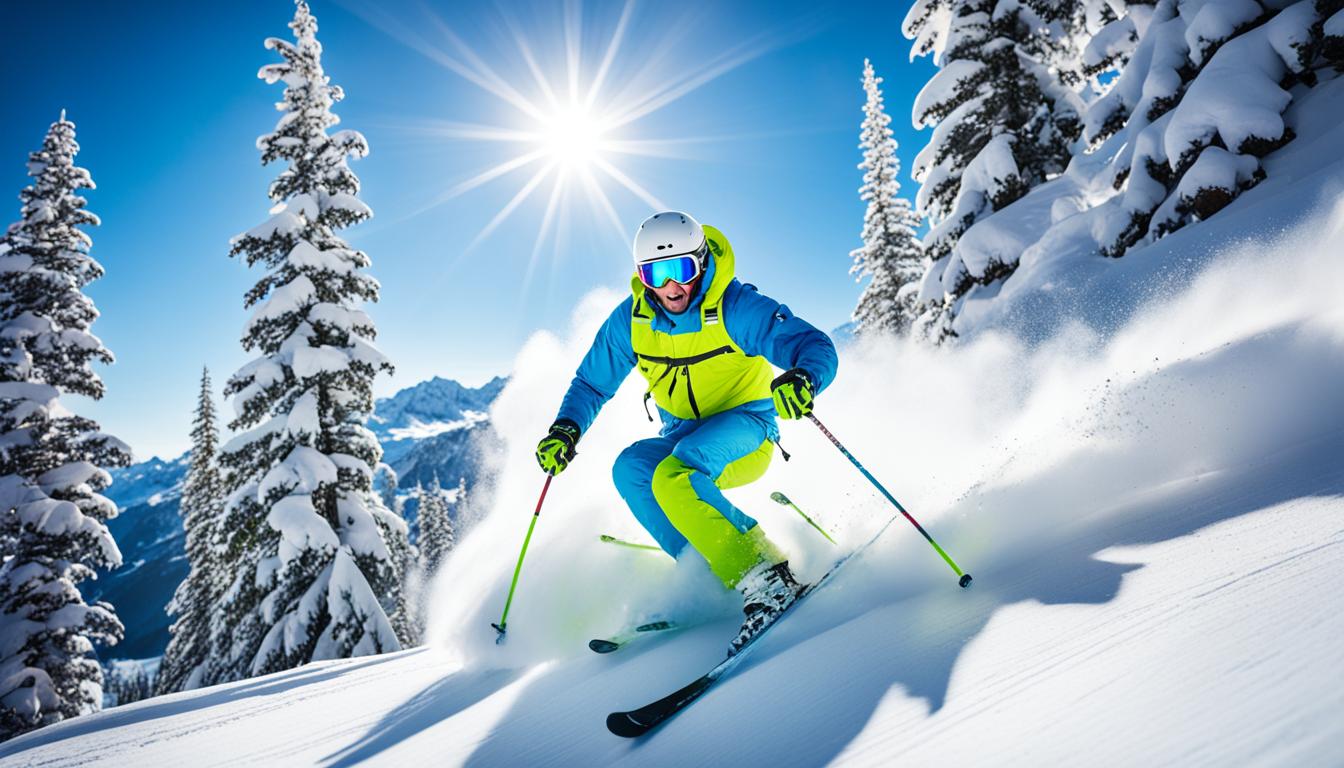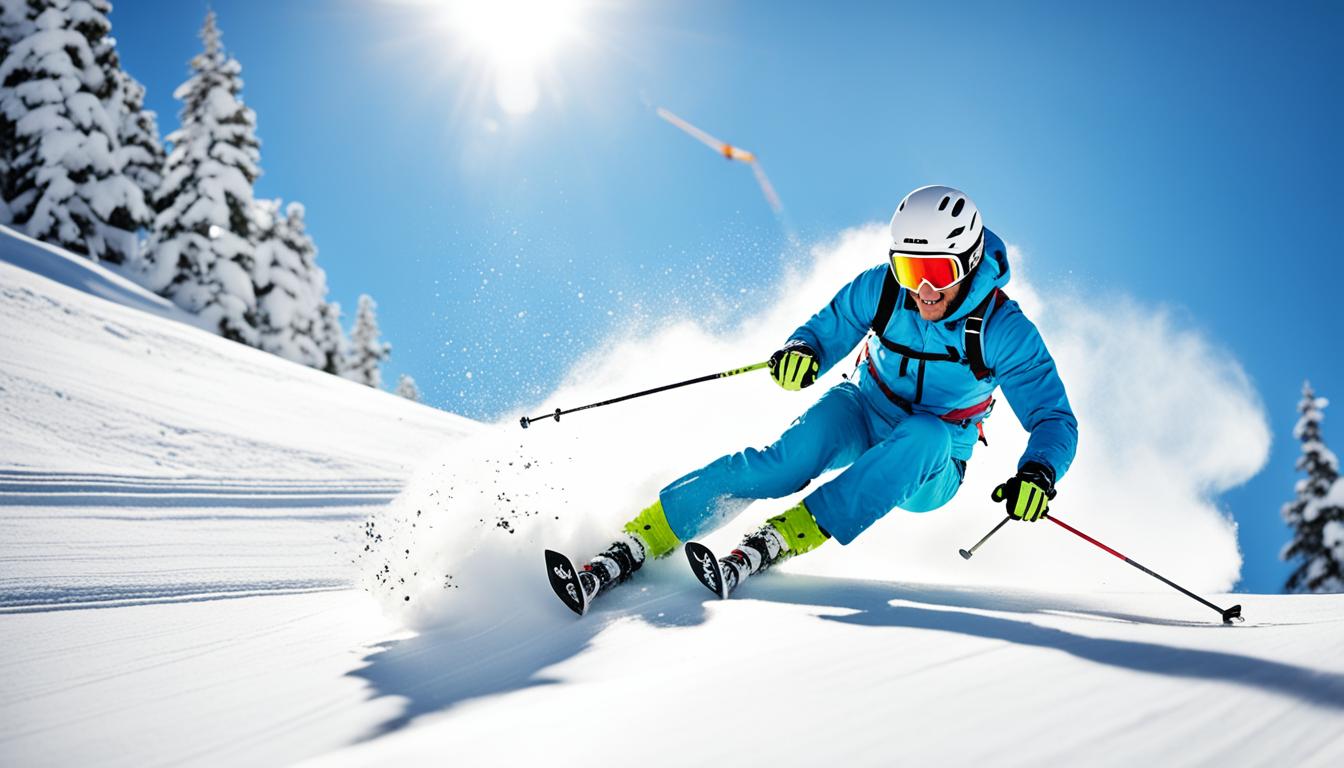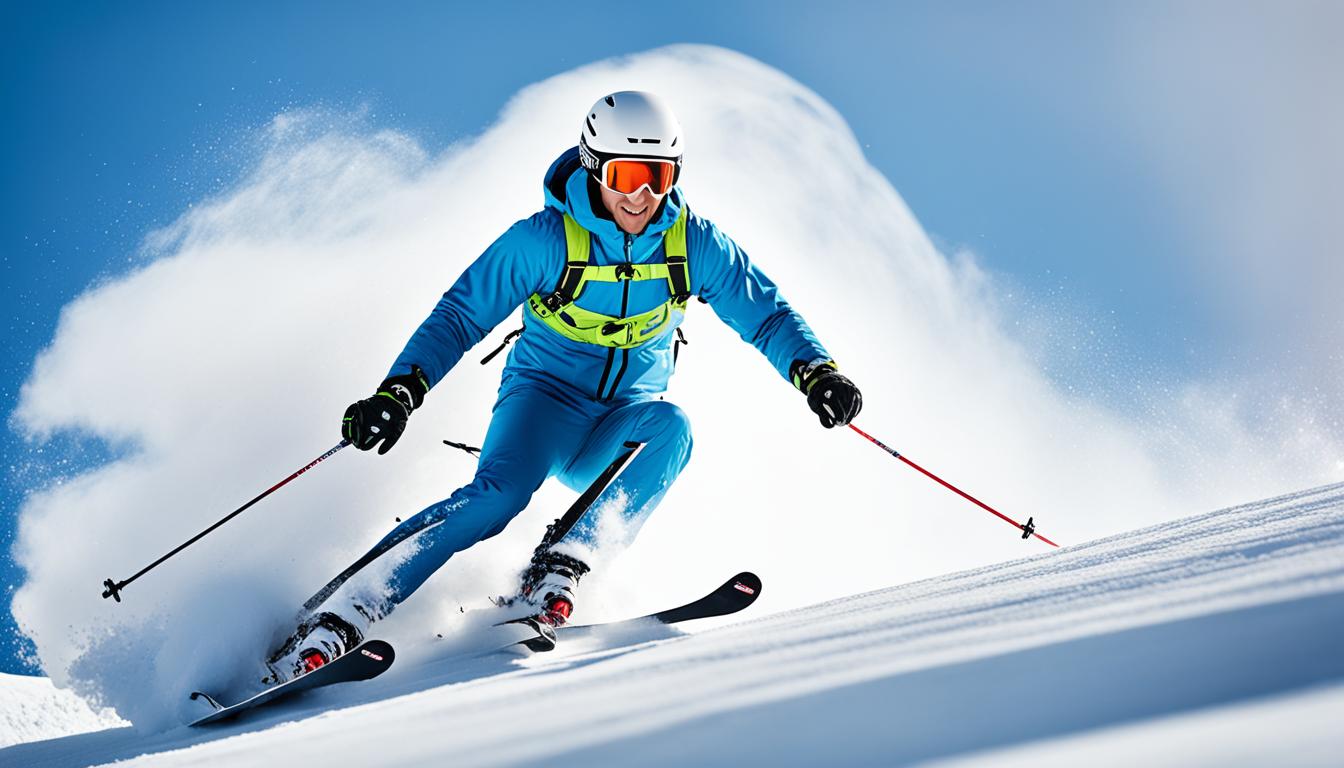Are you ready to hit the slopes and make the most of the ski season? To ensure a fantastic skiing experience, it’s important to take care of your body by fueling it with the right nutrition and staying properly hydrated. Whether you’re a seasoned skier or planning your first ski trip, these nutrition and hydration tips will help you perform at your best and make the most out of your time on the slopes.
Key Takeaways:
- Proper hydration and nutrition are crucial for optimal performance and endurance while skiing.
- Incorporate complex carbs in your pre-ski meal to provide the body with the energy it needs.
- Drink about 12 ounces of water per hour while skiing to stay hydrated.
- Consider adding electrolyte powders or drops to your water to prevent muscle cramping.
- Pack pocket snacks such as trail mix, protein bars, and PB&J sandwiches to keep your energy levels high.
Preparing Your Body for Skiing: Fitness and Nutrition
Getting fit for skiing is essential to prevent muscle soreness and enhance your performance on the slopes. Incorporating specific exercises and maintaining proper nutrition can help you prepare your body for the demands of skiing. Here are some key considerations:
Fitness for Skiing:
1. Incorporate exercises that strengthen your legs and build stamina, such as running, cycling, and circuit training. These activities will improve your endurance and help you navigate the slopes with ease.
2. Yoga is an excellent practice to enhance flexibility and strength, which are vital for skiing. Regular yoga sessions can improve your balance and stability on skis.
Nutrition for Skiing:
1. Start your day with a balanced breakfast that includes complex carbohydrates. This will provide sustained energy throughout the day. Opt for options like whole-grain cereal, oatmeal, or wholemeal toast.
2. Pack snacks that combine carbohydrates with a small amount of protein to minimize muscle damage and keep your energy levels high while skiing. Trail mix, energy bars, and fruit are convenient options to carry with you on the slopes.
3. For lunch, focus on a well-rounded meal that includes a balance of carbohydrates, lean protein, and healthy fats. This will replenish your energy stores and provide necessary nutrients for optimal performance. Consider options like a turkey or grilled chicken sandwich, whole wheat pasta with a side salad, or a warm chicken noodle soup.
4. Stay hydrated throughout the day, especially at higher altitudes. Drink water regularly and consider using a backpack with a water bladder for easy access. Hydration keeps your body functioning optimally and helps prevent altitude-related symptoms.
5. After skiing, make sure to have a post-workout snack or meal to aid in recovery and reduce muscle soreness. Aim for a combination of complex carbohydrates, protein, and fruits/vegetables. Options like a protein shake, whole grain wrap with grilled chicken and veggies, or a vegetable stir-fry with tofu can be nutritious choices.
Remember that proper fitness and nutrition are key to ensuring you have an enjoyable and successful skiing experience. By incorporating these practices into your routine, you’ll be well-prepared to take on the slopes with confidence.
| Pre-Skiing Exercises | Benefits |
|---|---|
| Running | Strengthens legs and improves endurance |
| Cycling | Builds stamina and enhances cardiovascular fitness |
| Circuit Training | Targets multiple muscle groups and improves overall fitness |
| Yoga | Enhances flexibility and strengthens core muscles |
Fueling Your Body for Skiing: Meal Planning and Hydration
Eating a balanced breakfast before skiing is crucial for starting the day with enough energy. Choices like porridge, muesli, wholemeal toast, and fruit juice provide the necessary complex carbs and hydration. A balanced meal ensures that we have enough energy to tackle the slopes and enjoy our skiing adventures to the fullest.
While skiing, it’s important to keep our energy levels high and avoid any crashes caused by low blood sugar. Packing snacks that are easy to carry and consume on the go can make a significant difference. Energy bars, trail mix, and fresh fruit are convenient and nutritious options that help us maintain stamina throughout the day.
“A well-planned lunch during our skiing breaks can keep us fueled and ready for more action. Opt for meals that include a balance of carbs, lean protein, and fruits/vegetables. Good choices include turkey or grilled chicken sandwiches, pasta with a side salad, or chicken noodle soup.”
Daily Meal Plan:
| Meal | Options |
|---|---|
| Breakfast | Porridge with fruit and nuts Wholemeal toast with avocado or almond butter Omelette with veggies and whole-grain toast |
| Snacks | Energy bars Trail mix (nuts, dried fruits, and seeds) Fresh fruit (apples, bananas, or oranges) |
| Lunch | Turkey or grilled chicken sandwich with whole-grain bread Pasta with a side salad (include leafy greens and colorful veggies) Chicken noodle soup with whole-grain bread |
| Post-Skiing | Hydrating smoothie with fruits, vegetables, and Greek yogurt Quinoa salad with mixed vegetables and grilled chicken Salmon with roasted sweet potatoes and steamed broccoli |
After an exhilarating day on the slopes, it’s important to replenish our energy stores and support muscle recovery. A well-rounded post-skiing meal should include complex carbs, protein, fruits/vegetables, and healthy fats. This combination of nutrients helps us refuel, repair, and prepare for the next day of skiing adventures.
Hydration is essential, especially at high altitudes where dehydration can occur more rapidly. We should drink water throughout the day to avoid the negative effects of altitude on our hydration levels. Adding a small amount of salt to our water can help maintain electrolyte balance and further enhance hydration.

By following a well-rounded meal plan and staying properly hydrated, we ensure that our bodies are fueled and ready to conquer the slopes. With the right nutrition and hydration strategies in place, we can optimize our skiing performance, maximize endurance, and make the most of our ski season.
Hydration Tips for Skiing: Staying Hydrated on the Slopes
When hitting the slopes, proper hydration is crucial, especially at high altitudes. Staying hydrated while skiing can help prevent symptoms of altitude sickness, such as headaches and dry mouth, and improve your overall skiing experience.
Here are some hydration tips to help you stay hydrated during your skiing adventures:
1. Drink Water Throughout the Day
Make it a habit to drink water consistently throughout the day. Keeping yourself well-hydrated can help prevent dehydration and maintain your body’s fluid balance. Aim for at least 64 ounces of water per day, and drink about 12 ounces of water per hour while skiing.
2. Carry a Water Bottle or Use a Backpack with a Water Bladder
Having water readily available is essential for staying hydrated on the slopes. Consider carrying a water bottle or using a backpack with a built-in water bladder for easy access to hydration.
3. Add a Pinch of Salt to Your Water
Adding a small amount of salt to your water can help maintain electrolyte balance and improve hydration. Electrolytes play a crucial role in hydration, especially during intense physical activities like skiing.
4. Avoid Excessive Alcohol Consumption
While it may be tempting to indulge in après-ski drinks, excessive alcohol consumption can counteract the benefits of proper hydration and nutrition. Alcohol can dehydrate the body, leading to decreased performance and increased fatigue. Remember to drink alcohol in moderation and prioritize water intake.
5. Take Advantage of Outdoor Water Stations
Many ski resorts have outdoor water stations conveniently located throughout the slopes. Take advantage of these stations to hydrate quickly and efficiently during your skiing sessions.
Proper hydration plays a significant role in minimizing muscle damage and improving recovery after skiing. Stay hydrated and enjoy your skiing adventures to the fullest!
Conclusion
Proper nutrition and hydration are essential for optimizing your skiing performance and endurance on the slopes. By following these ski nutrition and hydration tips, you can maintain energy levels and maximize your skiing experience.
Start your day with a balanced breakfast that includes complex carbohydrates to fuel your body. Pack snacks like trail mix and protein bars to keep your energy levels high throughout the day. During lunch breaks, opt for balanced meals that include a combination of carbs, lean proteins, and fruits or vegetables.
Staying hydrated is crucial, especially at high altitudes. Drink water throughout the day and consider using a backpack with a water bladder for easy access. Adding a small amount of salt to your water can help maintain electrolyte balance. And remember, proper hydration can minimize muscle damage and improve recovery after skiing.
By prioritizing ski nutrition and hydration, you’ll be able to optimize your skiing performance, enhance your endurance, and enjoy a stronger and healthier ski season. So, take care of your body and make the most out of your time on the slopes.
FAQ
What are some nutrition and hydration tips for skiing?
Proper hydration and nutrition are crucial for optimal performance and endurance while skiing. Aim for about 64 ounces of water per day and drink about 12 ounces per hour while skiing. Pack snacks like trail mix, protein bars, and PB&J sandwiches. Consult a registered dietitian for a personalized eating plan.
How can I prepare my body for skiing?
Getting fit before skiing is important for preventing muscle soreness and improving performance on the slopes. Incorporate exercises like running, cycling, and circuit training to strengthen the legs and build stamina. Yoga can also help improve flexibility and strength.
What should I eat before, during, and after skiing?
A balanced pre-ski meal should include complex carbs, protein, veggies, and fluids. Pack snacks with carbs and a small amount of protein to keep energy levels high. During lunch breaks, opt for balanced meals with a combination of carbs, lean protein, and fruits/vegetables. After skiing, replenish energy stores with complex carbs, protein, fruits/vegetables, and healthy fats.
How can I stay hydrated while skiing?
Hydration is important at high altitudes, so make sure to drink water throughout the day and consider using a backpack with a water bladder. Add electrolyte powders or drops to your water for added hydration. Avoid consuming excessive amounts of alcohol, as it can counteract the benefits of proper hydration.
Why is hydration important while skiing?
Hydration is especially important while skiing, particularly at high altitudes. Proper hydration can minimize muscle damage, improve recovery, and prevent symptoms of altitude sickness. Drink water throughout the day and consider adding a small amount of salt to maintain electrolyte balance.




